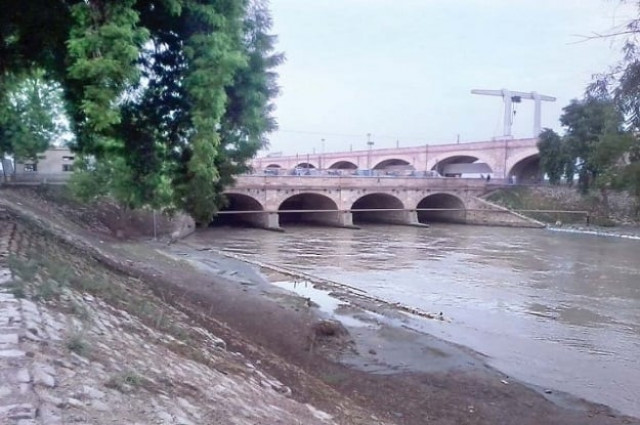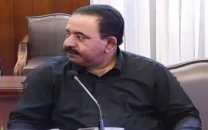Corruption and incompetence: Despite flood and rains, tail-end farmers face water shortage
Farmers say mismanagement and corruption are responsible for the shortage

Farmers say mismanagement and corruption are responsible for the shortage. PHOTO: FILE
"There is abundant water in the irrigation system to irrigate all the land in the tail-end areas but mismanagement and corruption have deprived thousands of families from earning," said Abdul Majeed Lund, one of the dozens of farmers who have pitched up a hunger strike camp outside the press club in Badin. They have not been getting water for two months, which has resulted in thousands of acres of rice crop being damaged.
The protesters spent their Eid days at the camp where they began the protest nine days ago, demonstrating for four to five hours each day. The protest continued for the ninth day on Thursday. According to Lund, tens of thousands of acres that are provided water through the distributaries of Phuleli canal and Akram canal, which stream from the Kotri barrage, are being affected due to the scarcity. Around 107,800 cusecs of water, which equals to roughly 215,000 acre-foot per day, was recorded in the upstream of the Kotri barrage on Thursday.
Representatives of Jamaat-e-Islami (JI), Pakistan Peoples Party (PPP) and Pakistan Muslim League - Nawaz, among others, have visited the camp. "Flood torrents are passing through the country's rivers but people in parts of Badin are living in a drought-like situation," said Liaquat Baloch, the general secretary of JI. He visited the camp on Tuesday to express solidarity after attending the JI's annual Eid party in Badin.
On Wednesday, PPP MPA Muhammad Nawaz Chandio convened a meeting with the farmers of the affected areas at the head regulator of Akram canal in Kadhan subdivision. After hearing their complaints, he asked the officials of the Sindh Irrigation and Drainage Authority (Sida) to address the problem within seven days, according to Sida spokesperson Hizbullah Mangrio. Chandio is also the vice-president of the board of governors of Sida and admitted that mismanagement and corruption have resulted in the shortage of water.
According to Mangrio, executive engineer Aijaz Shah admitted during his briefing to the minister and farmers that mismanagement and reduced capacity in the tail-end irrigation system were the cause of the shortage. "Also, he didn't deny that water theft in the head reaches [of the irrigation network] continues," said Mangrio.
Although the protesting farmers claim that tens of thousands of acres have been affected by the shortage, the Sida spokesperson differed and put the figure at between 1,500 to 2,000 acres.
The existing situation is not new for Badin's farmers. A year ago, a far worse shortage was witnessed, forcing Chief Minister Qaim Ali Shah to visit the town to comfort the enraged farmers. Like the MPA, he also admitted that mismanagement resulted in the scarcity and gave orders for a long-term solution of the problem - apparently to little effect.
Published in The Express Tribune, July 24th, 2015.



















COMMENTS
Comments are moderated and generally will be posted if they are on-topic and not abusive.
For more information, please see our Comments FAQ